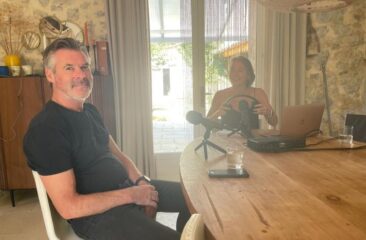Op Spotify houd ik al een tijd de playlist ‘An Analog Guy in a Digital World‘ bij. Deze lijst bevat een mix van elektronische en ambient muziek van artiesten zoals Martin Roth, Nils Frahm en Oliver Koletzki.
Op basis van deze lijst krijg ik zo nu en dan nieuwe nummers aangereikt door Spotify zoals het nummer ‘The Four Agreements‘ van Matthew Dekay en Martin Roth op Anjunadeep 11. Een prachtig nummer waarin de gesproken woorden van Don Miguel Ruiz zijn gecombineerd met de muzikale compositie van Above & Beyond’s ‘Love Is Not Enough’:
De gesproken tekst is een fragment uit het boek “The Four Agreements” van Don Miguel Ruiz. Ruiz presenteert een filosofisch perspectief waarin hij stelt dat mensen constant dromen, zowel wanneer ze wakker zijn als wanneer ze slapen. Hij beschrijft hoe onze perceptie van de werkelijkheid en onze overtuigingen sterk beïnvloed worden door de ‘droom van de planeet’ – een collectief van overtuigingen, regels, culturen, en sociale structuren die door de mensheid zijn gecreëerd en doorgegeven.
Het kernpunt van Ruiz’s betoog is dat onze gedachten en overtuigingen voornamelijk worden gevormd door de maatschappij waarin we leven. Vanaf onze geboorte worden we ondergedompeld in deze collectieve droom, waarbij familie, scholen, religies en andere sociale structuren ons leren hoe we moeten denken en handelen volgens de normen en waarden van die maatschappij. Dit proces van sociaal leren beïnvloedt onze perceptie van wat goed, slecht, mooi, lelijk, juist of verkeerd is.
Volgens Ruiz is het belangrijk om ons bewust te worden van deze externe invloeden en de automatische overeenkomsten die we in onze kindertijd hebben gevormd. Door bewustzijn te ontwikkelen over deze processen, kunnen we beginnen met het kiezen van onze eigen overtuigingen en waarden, in plaats van die blindelings te accepteren die ons zijn aangeleerd. Dit concept sluit aan bij ideeën over persoonlijke vrijheid, zelfbewustzijn en de kracht van het individu om zijn of haar eigen realiteit te vormen.
Voor geinteresseerden de volledige tekst:
What you are seeing and hearing right now is nothing but a dream
You are dreaming right now in this moment
You’re dreaming with the brain awake
Dreaming is the main function of the mind
And the mind dreams 24 hours a day
It dreams when the brain is awake
And it also dreams when the brain is asleep
The difference is that when the brain is awake
There is a material frame
That makes us perceive things in a linear way
When we go to sleep, we do not have the frame
And the dream has the tendency to change constantly
Humans are dreaming all the time
Before we were born, the humans before us
Created a big outside dream
That we will call society’s dream or the dream of the planet
The dream of the planet is the collective dream
Of billions of smaller, personal dreams
Which together create a dream of a family
A dream of a community, a dream of a city
A dream of a country, and finally a dream of the whole humanity
The dream of the planet includes all of society’s rules
Its beliefs, its laws, its religions
Its different cultures and ways to be
Its governments, schools, social events, and holidays
We are born with the capacity to learn how to dream
And the humans who live before us
Teach us how to dream the way society dreams
The outside dream has so many rules
That when a new human is born
We hook the child’s attention
And introduce these rules into his or her mind
The outside dream uses Mom and Dad
The schools and religion to teach us how to dream
Attention is the ability we have to discriminate and to focus
Only on that which we want to perceive
We can perceive millions of things simultaneously
But using our attention
We can hold whatever we want to perceive
In the foreground of our mind
The adults around us hooked our attention
And put information into our minds through repetition
That is the way we learned everything we know
By using our attention we learned a whole reality, a whole dream
We learned how to behave in society
What to believe and what not to believe
What is acceptable and what is not acceptable
What is good and what is bad
What is beautiful and what is ugly
What is right and what is wrong
It was all there already — all that knowledge
All those rules and concepts about how to behave in the world
When you were in school
You sat in a little chair
And put your attention on what the teacher was teaching you
When you went to church
You put your attention on
What the priest or minister was telling you
It is the same dynamic with Mom and Dad
Brothers and sisters
They were all trying to hook your attention
We also learn to hook the attention of other humans
And we develop a need for attention
Which can become very competitive
Children compete for the attention of their parents
Their teachers, their friends
“Look at me!
Look at what I’m doing!
Hey, I’m here.”
The need for attention becomes very strong
And continues into adulthood
The outside dream hooks our attention
And teaches us had to believe
Beginning with the language that we speak
Language is the code
For understanding and communication between humans
Every letter, every word in each language is an agreement
Once we understand the code
Our attention is hooked
And the energy is transferred from one person to another
It was not your choice to speak English
You didn’t choose your religion or your moral values
They were already there before you were born
We never had the opportunity
To choose what to believe or what not to believe
We never chose even the smallest of these agreements
We didn’t even choose our own name
As children, we didn’t have the opportunity to choose our beliefs
But we agreed with the information that was passed to us
From the dream of the planet via other humans
The only way to store information is by agreement
The outside dream may hook our attention
But if we don’t agree, we don’t store that information
As soon as we agree, we believe it, and this is called faith
To have faith is to believe unconditionally
Bron: SonicHits



